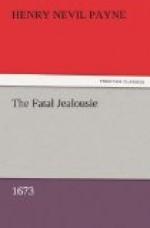INTRODUCTION
None of Henry Nevil Payne’s plays, The Fatal Jealousie (1673), The Morning Ramble (1673), The Siege of Constantinople (1675), bears his name on the title-page. Plenty of external evidence exists, however, to prove his claim to them. John Downes, in Roscius Anglicanus (1708), has this to say: “Loves Jealousy [i.e. The Fatal Jealousy], and The Morning Ramble. Written by Mr. Nevil Pain. Both were very well Acted, but after their first run, were laid aside, to make Room for others; the Company having then plenty of new Poets” (ed. Montague Summers, London, n.d., pp. 33-34). “After the Tempest, came the Siege of Constantinople, Wrote by Mr. Nevill Pain” (ibid., p. 35). Langbaine’s An Account of the English Dramatick Poets (1691) gives no author for The Siege of Constantinople, but says of The Fatal Jealousy that it is “ascribed by some to Mr. Pane” (p. 531) and of The Morning Ramble that this “Play is said to be written by One Mr. Pane, and may be accounted a good Comedy” (p. 541).
We do not have to depend on the early historians of the English drama for certain knowledge that Payne was for a time a dramatist. Though his brief excursion into the theater must later have seemed to him a minor episode in his life, Payne’s enemies were aware of the fact that he was a playwright and have written their knowledge into the record of his treasonable activities. For example, the author of a burlesque life of Payne, which contains, so far as I know, the only connected account of his activities, makes this useful remark: “Then [after his return from Ireland in 1672] he composes a Tragedy of a certain Emperour of Constantinople, whom he never knew; but in whose person he vilifies a certain Prince [Charles II], whom he very well knows” (Modesty Triumphing over Impudence ... 1680, pp. 18-19).
As an agent of the Catholic party, Payne had excellent reasons for wishing to keep his affairs well veiled. What we know of his life has had to be pieced together from information found in state papers, court records, and “histories” of the branches of the damnable Popish plots.* The date of his birth is not known, nor of his death, unless Summers was correct in giving it (without supporting evidence) as 1710 (The Works of Aphra Behn, 1915, V, 519).
[Footnote: For this biographical sketch of Payne I have drawn on my “Henry Nevil Payne, Dramatist and Jacobite Conspirator,” published in The Parrott Presentation Volume, Princeton, 1935, pp. 347-381.]
Payne’s first opportunity to serve the Catholic party came, apparently, in 1670, when he went to Ireland in the employ of Sir Elisha Leighton, who was private secretary to the new lord lieutenant, Lord Berkeley. By April 1672 Berkeley’s pro-Catholic rule had so alienated the city council of Dublin that he was ordered to return to England and the Earl of Essex was sent out in his place. From Essex we learn that Payne was deeply involved in the machinations of Berkeley and that he continued to stir up trouble in Ireland even after his return to England.




